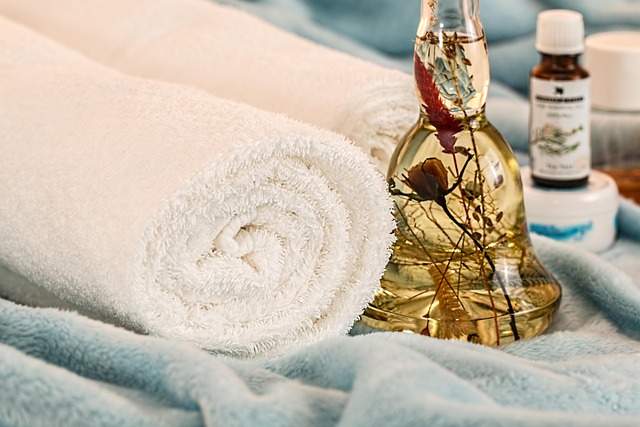Acne, affecting all ages, requires tailored care, especially for sensitive skin. Triggers include cosmetics, humidity, and stress. Personalized routines with gentle, non-comedogenic products are key. Regular sensitive skin facials deeply cleanse, soothe inflammation, and promote healthier skin turnover. Holistic approaches combining natural remedies, diet, hydration, and exercise further improve skin health. Sensitive skin facials offer a gentle, effective acne care solution.
Acne is a common concern, especially for those with sensitive skin. Understanding its causes and triggers is the first step towards effective prevention and treatment. This article guides you through a comprehensive approach, from creating a tailored skincare routine to exploring natural remedies and lifestyle changes. We also delve into the benefits of facials for sensitive skin, offering insights into how professional treatments can complement your care regimen.
Understanding Acne: Causes and Triggers for Sensitive Skin
Acne is a common skin condition that can affect people of all ages, but its impact on sensitive skin deserves special attention. Understanding the causes and triggers is the first step in developing an effective prevention and treatment strategy. Acne forms when pores become clogged with oil, dead skin cells, and bacteria, leading to redness, inflammation, and sometimes scarring. For those with sensitive skin, certain factors can exacerbate this condition.
Sensitive skin facials are a gentle approach to addressing acne without causing further irritation. They focus on cleaning the skin deeply while avoiding harsh chemicals and aggressive treatments. Triggers for sensitive acne include certain cosmetics, skincare products, or even environmental factors like humidity and stress. Identifying these triggers is crucial in managing acne effectively. Regular facial treatments, combined with a tailored skincare routine and a mindful approach to daily routines, can significantly improve sensitive skin’s condition and reduce the appearance of acne over time.
Creating a Skincare Routine for Clear and Calm Complexion
Creating a skincare routine tailored for clear and calm complexion begins with understanding your skin’s unique needs, especially if you have sensitive skin. Many over-the-counter products can irritate or aggravate existing acne, making it crucial to opt for gentle, non-comedogenic alternatives. A good starting point is to incorporate a mild cleanser, hydrating moisturizer, and sunscreen into your daily regimen.
For those with more severe cases of acne or sensitive skin facials, consulting a dermatologist is advisable. They can recommend products formulated for acne-prone skin, including those with ingredients like benzoyl peroxide or salicylic acid, which are effective in unclogging pores and reducing inflammation. Remember, consistency is key; adhering to a regular skincare routine can significantly improve your skin’s health over time.
The Role of Facials in Preventing and Treating Acne
Facials play a significant role in both preventing and treating acne, especially for those with sensitive skin. Regular facial treatments can deeply cleanse the skin, removing excess oil, dirt, and makeup residues that often clog pores and lead to acne breakouts. Moreover, sensitive skin facials are designed to soothe and calm inflamed skin while unclogging pores gently without causing further irritation.
Professional estheticians use specialized products tailored for various skin types, including sensitive skin. These treatments may include exfoliation, extractions, and application of masks that hydrate, nourish, and repair the skin. By promoting healthier skin cell turnover and enhancing the skin’s natural defensive mechanisms, regular facials can help prevent future acne outbreaks and restore a clear, radiant complexion.
Natural Remedies and Lifestyle Changes for Effective Acne Management
Many people turn to natural remedies and lifestyle changes as part of their acne management routine, especially those with sensitive skin who may experience irritation from traditional treatments. Incorporating certain ingredients into your skincare regimen can help prevent and treat breakouts effectively. For instance, tea tree oil has long been hailed for its antibacterial properties, making it a popular choice for calming inflammation and reducing the appearance of blemishes. Additionally, aloe vera is known to soothe irritated skin and promote healing, making it ideal for those with sensitive complexions.
Lifestyle changes play a significant role in managing acne. Maintaining a balanced diet rich in fruits and vegetables can help reduce inflammation and improve overall skin health. Staying hydrated by drinking plenty of water also supports skin clarity. Furthermore, regular exercise boosts circulation, which can help unclog pores and minimize breakouts. Opting for gentle, non-irritating sensitive skin facials can also be beneficial, as they often use natural ingredients and tailored techniques to address acne without further aggravation.
Acne can be a challenging condition, especially for those with sensitive skin. However, by understanding its causes and triggers, developing a tailored skincare routine, considering facial treatments, and adopting natural remedies along with lifestyle changes, you can effectively prevent and manage acne. For sensitive skin in particular, facials offer a gentle yet powerful approach to deep cleansing and soothing the complexion. Combining these strategies allows for a comprehensive, effective, and safe approach to achieving and maintaining a clear, calm complexion.
